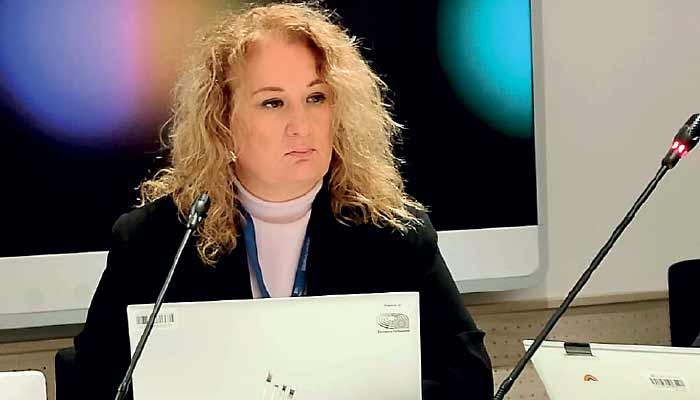Monday Feb 16, 2026
Monday Feb 16, 2026
Friday, 10 October 2025 04:26 - - {{hitsCtrl.values.hits}}

EDPB Transparency and Legal Officer Roberta Muraro
By Charumini de Silva in Brussels
European Data Protection Board (EDPB) Transparency and Legal Officer Roberta Muraro yesterday clarified that governments may legitimately restrict the disclosure of certain information in the public interest, particularly in matters concerning international relations and ongoing negotiations under EU data protection standards.
In response to a query on Sri Lanka’s recent Memorandum of Understanding (MoU) on Defence Cooperation with India, Muraro explained that, according to EU principles, withholding information can be justified, where disclosure could jeopardise diplomatic negotiations or sensitive international engagements.
“In such cases, the Government has the right to protect data and not make it public in the interest of safeguarding international relations,” she told a group of journalists from Sri Lanka who are on a study tour in Belgium, organised by the Internews, under the EU-funded Indo-Pacific Media Resilience Program.
“This exemption is often used to protect ongoing negotiations or sensitive agreements, particularly with non-EU countries or international organisations,” she added.
However, Muraro noted that once negotiations are concluded, the justification for maintaining secrecy may no longer apply, subject to case-by-case assessment by authorities or courts.
“Normally, the Court of Justice holds that once a process is finalised, it should not remain confidential, unless exceptional circumstances exist,” she added.
Her comments come as scrutiny continues over the defence cooperation MoU signed between Sri Lanka and India in April 2025 during Indian Prime Minister Narendra Modi’s visit to Colombo. The agreement, which the Foreign Affairs Ministry has declined to disclose in detail, is said to formalise existing informal defence arrangements between the two nations.
Officials from both countries have indicated that the MoU covers training exchanges, defence industry collaboration, technology and research partnerships, financial frameworks, and the protection of classified information.
On 22 April, Cabinet Spokesman and Minister Dr. Nalinda Jayatissa said Sri Lanka cannot unilaterally disclose the full contents of the recent Defence Cooperation MoU signed with India without mutual agreement (https://www.ft.lk/front-page/Disclosure-of-SL-India-defence-MoU-requires-Indian-consent-Govt/44-775756).
On 4 August, the Supreme Court dismissed two Fundamental Rights petitions that sought to invalidate the recent MoUs signed between Sri Lanka and India (https://www.ft.lk/news/Supreme-Court-dismisses-petitions-challenging-Sri-Lanka-India-MoUs/56-779916).